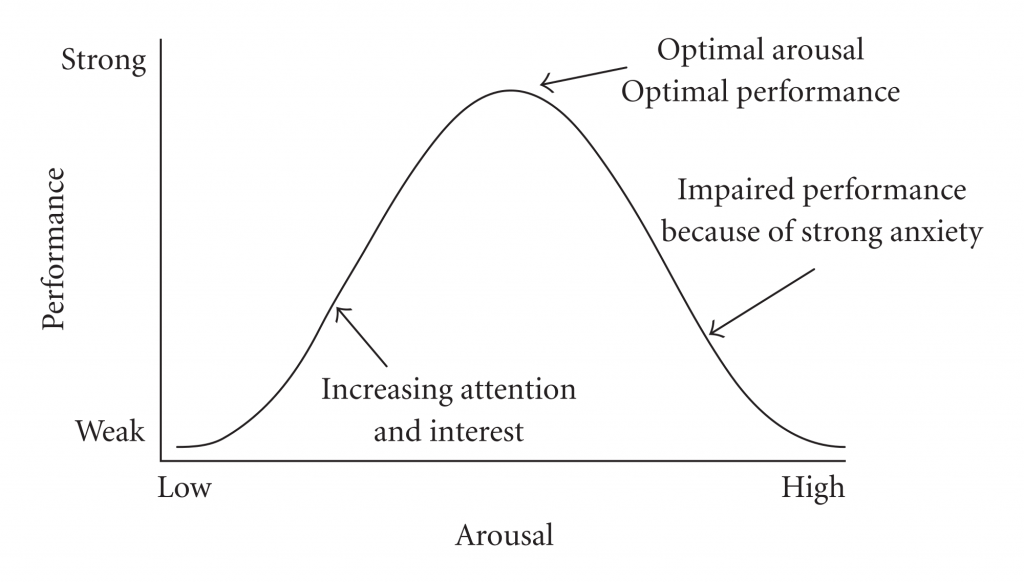Manage Stress
There is a ‘sweet spot’ where some, but not too much stress can help to focus attention and increase academic performance. The relationship between stress and performance is known as the Yerkes Dodson Curve and is illustrated below:

The Yerkes Dodson curve shows that as stress levels increase, performance gradually increases. And then as stress continues to rise past a ‘sweet spot,’ performance gradually decreases. As can be seen in the illustration above, the Yerkes-Dodson curve forms an ‘inverted U’ shape when graphed.
The level of stress required for optimal performance also varies with the familiarity and complexity of a task. The more complex and unfamiliar a task, the lower the level of stress required for optimal performance. This means that for HSC students, keeping stress levels down may be particularly important for making sense of difficult maths and science concepts, or for planning out and composing longer written tasks.
HSC students are often tempted to dedicate as many hours as is physically possible to study, particularly as important trial exams and the final HSC exams approach. The Yerkes Dodson curve suggests that managing stress is important.
There are a number of things HSC students can do to manage stress. Four key areas to focus on include sleep, exercise, social connection, and diet. The Australian Government Department of Health guidelines suggest that 14-17-year-old young people require an uninterrupted 8-10 hours of sleep. Similar government guidelines recommend 60 minutes or more of moderate to vigorous physical activity each day.
It’s notable that government guidelines suggest that teenagers require more exercise each day than adults. Exercise can be particularly powerful in managing stress as it helps to burn off the hormone cortisol – a part of the body’s natural stress response. Socially, HSC students will benefit from spending time with friends. They will also benefit from a diet rich in fruits and vegetables with limited sugar and caffeine.
A great practical suggestion for managing stress is to engage in team sport. By engaging in team sport, HSC students receive exercise and social connection at the same time. The vigorous physical activity inherent in many team sports can also have knock on benefits for healthy sleep.
What works best for an individual young person will depend on their interests and the individual circumstances of their family. However, taking the time to attend to those aspects of life that will help to manage stress is likely to not only leave HSC students feeling better, but also contribute towards a great HSC result.
Consider Learning Style
Students each vary in the degree to which they can process information presented in each sensory modality. For instance, some students process information most efficiently by reading and writing.
Others are most efficient when processing information that is heard. Students may learn most efficiently through either a single, or a combination of visual, auditory, reading/writing, or doing sensory modalities. The sensory modality, or combination of sensory modalities through which a student most efficiently learns is called their learning style.
HSC study is more efficient if information is processed in a modality consistent with a student’s learning style. Education researchers have found that approximately 40% of students have a single learning style preference, 30% have two learning style preferences, and about 10% have three
learning style preferences.
Students often prepare for important exams by reading a textbook and writing down notes in the hope that this will facilitate recall during the exam. This may be a great way to learn if reading/writing is a students’ learning style preference. However, if a student had a primary learning style preference for hearing information, reading and writing notes may be an inefficient exam preparation technique.
This student would likely benefit from reading summarized notes aloud, communicate understanding of concepts out aloud to other people, or recording summarized notes and listening to them.
How can a student learn more about their learning style? There are several online resources available to help students understand which sensory modalities are likely to help them process information most efficiently. Click here for an online resource.
This website also lists specific strategies that complement particular learning styles.
Reference: Fleming, N. D. (2001). Teaching and learning styles: VARK strategies. Christchurch, New Zealand: N.D. Fleming.
Keep Professionalism in Check
For many HSC students, the pursuit of excellence may feel like an unspoken expectation from teachers, school leaders, or family members. For a student who has their heart set on a competitive university course, the continued pursuit of excellence over the HSC year may feel like a pre-requisite to entry.
For many students though, the goal of achieving a high ATAR can unfortunately become linked to their sense of self-worth. The problem that this creates is that with self-worth exposed for evaluation, the consequences of not meeting very high standards feel very high. This striving to achieve a very high standard which is linked to self-worth is called perfectionism.
Perfectionism often leads to experiences of anxiety and stress which can paradoxically impair performance. Students struggling with perfectionism also tend to attend very carefully to any signs that their high standards are not being met. This monitoring for errors depletes attentional resources from the task at hand.
Students struggling with perfectionism also tend to develop rigid rules and beliefs about their studies to ensure that their very high standards are met. For example, such students may feel that making errors is unacceptable, or that they do not have the luxury to take time off to rest or attend to other areas of their life. They also tend to engage in a range of perfectionistic behaviours.
The presence of one or more of the following behaviours may suggest that a person is being impacted by perfectionism:
- Excessive procrastinating
- Giving up easily
- Excessive list making and planning
- Slowness
- Excessive checking
- Reassurance seeking
Fortunately, perfectionism can be very well managed. The following strategies can help: Increasing awareness of and challenging rigid and unhelpful perfectionistic beliefs; Gradually reducing procrastination behaviours; and stress management techniques such as getting adequate sleep, exercise, and relaxation. If perfectionism appears to be a consistent difficulty, Psychologists are trained to provide personalised interventions and may be able to help.
